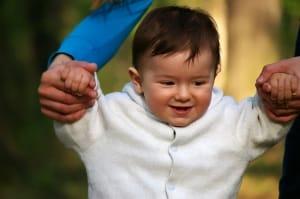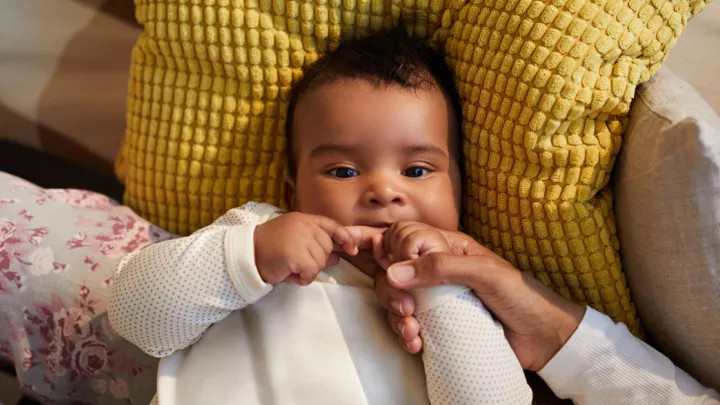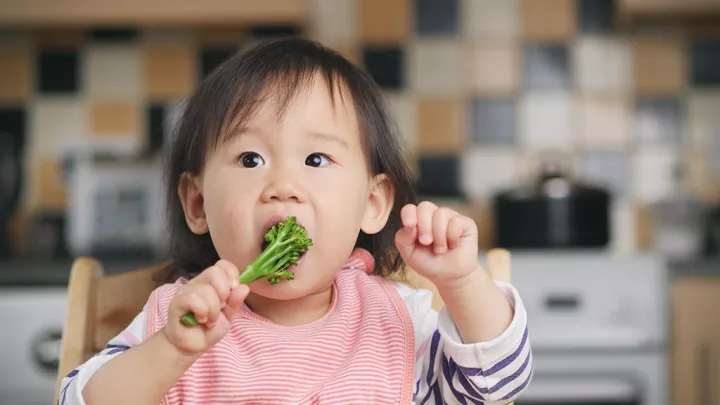Babies and Milestones
Some of the biggest thrills for parents come in their baby’s first year of life: the first smile, first “da-da,” first steps. But after reading the baby books, most new parents know what milestones should be reached and when, and many are disappointed or begin to worry if their children seem to be behind the curve. Such anxiety generally is misplaced, and can be avoided by focusing less on checking off items on a development chart and more on simply enjoying the glorious journey of your child’s growth.
Comparing your baby’s development to other infants or to norms on developmental charts should be avoided. Instead, it is important to know that babies develop at different rates and should only be compared to their individual milestones from the previous week or month. The baby who sits up weeks before his or her peers might be one of the last to learn how to crawl, or the 18-month-old who’s still communicating with grunts and gestures suddenly bursts forth with prepositional phrases at 2 years. Since babies aren’t identical, variations in stages of development are natural. How your child plays, learns, speaks and acts offers important clues about your child’s development. This general outline will give you an idea of what to expect in the first few months.
What most babies do at around 2 months and up:
Social and Emotional
- Begin to smile at people
- Briefly calm themselves (may bring hands to mouth and suck on hand)
- Try to look at parents
Language/Communication
- Coo, make gurgling sounds
- Turn head toward sounds

Cognitive (learning, thinking, problem solving)
- Pay attention to faces
- Begin to follow things with eyes and recognize people at a distance
- Begin to act bored (cries, fussy) if activity doesn’t change
Movement/Physical Development
- Hold head up and begin to push up when lying on stomach
- Make smoother movements with arms and legs
Babies achieve important milestones at every stage of their young lives. During their first year, babies grow and develop at an amazing speed. Their weight will double by 5 to 6 months, and triple by their first birthday, and they are constantly learning. Major achievements, called developmental milestones, include rolling over, sitting up, standing and possibly walking. No two babies are exactly alike. Your baby will develop at his or her own pace. Most babies reach certain milestones at similar ages. However, it’s not unusual for a healthy, “normal” baby to fall behind in some areas or race ahead in others.
When do babies start walking?
- Most babies won’t take their first steps until they are 14 months old. That said, some babies start as early as 7months or as late as 18 months old.
When do babies start crawling?

- Most babies start crawling between 7 and 9 months old, but some babies skip crawling altogether and learn to stand and walk first.
When do babies start teething?
- Babies start teething anywhere between 2 months and 12 months old, sometimes even later.
When do babies start talking?
- Babies start cooing and making vowel sounds between 6 weeks and 3 months, but most won’t start using basic words until they’re 9 to 14 months old.
When do toddlers learn colors?
- Most toddlers won’t learn to name every color until preschool, but you can start teaching the basic concept of color while your tot is still at home.
When do toddlers stop napping?
- cues from your toddler; he or she may be ready to drop the nap at 2 or 3 years old—or may need them until age 5. And even if your toddler doesn’t need to settle down for a full-fledged nap every day, you may want to schedule some quiet time for both of you to refuel for the afternoon.
These milestones are only guidelines. Your health care provider will evaluate your baby’s development at each well-baby visit. A mild delay in one area of development is generally not a cause for concern, but if it’s joined by other delays, then talk to your doctor. Also, let your pediatrician know when there’s a lag of more than a few months in any area of development.


